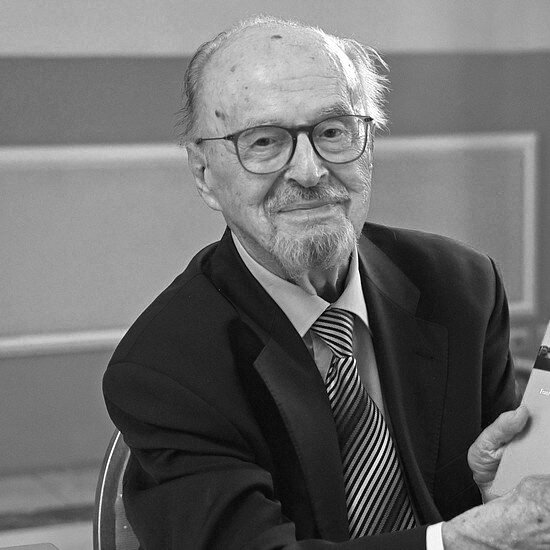Franz Karl Stanzel
(1923-2023)

In memoriam Franz Karl Stanzel (4 August 1923-17 October 2023)
Franz Karl Stanzel died on 17 October after having celebrated his one hundredth birthday on 3 October at the University of Graz, his alma mater, where he held a professorship at the English Department from 1962 to 1993. Born at Molln in Upper Austria, he attended school in Steyr. During the war Stanzel served in the German navy and was nearly drowned during an attack on his submarine. He spent two years as a prisoner of war in the UK and in Canada, and it was there that he was inspired to turn to English Studies as a career. He started to study under Herbert Koziol at the University of Graz. His main inspiration during a year at Harvard University was the encounter with Wellek and Warren’s A Theory of Literature, which also introduced him to Russian Formalism.
Stanzel is best known for his narratological work, starting with a PhD thesis on Tom Wolfe (1950). His habilitation thesis (tenure book) was his 1955 study Die typischen Erzählsituationen im Roman. Dargestellt an Tom Jones, Moby Dick, The Ambassadors, Ulysses u. a., English translation: Narrative Situations in the Novel. Tom Jones, Moby-Dick, The Ambassadors, Ulysses. Transl. James P. Pusack. (Bloomington: Indiana University Press, 1971). It was here that he devised his three typical narrative situations, the first-person narrative situation (Ich-Erzählung), authorial narrative situation (auktoriale Erzählsituation) and figural narrative situation (personale Erzählsituation). His work evolved from debates with the famous theories about narrative propounded by Käte Hamburger in The Logic of Fiction (Die Logik der Dichtung, 1957). Stanzel’s work had an impact on the theoretical concepts of Dorrit Cohn’s research, especially as regards the distinction between first and third-person narration.
Stanzel’s major theoretical contribution to narrative studies was his revision of his early theories in Theorie des Erzählens (Göttingen: Vandenhoeck & Ruprecht, 1979), whose second and revised edition was translated into English in 1984 by Charlotte Goedsche and with a preface by Paul Hernadi. The book, which has gone to eight editions, has also been translated into Japanese, Czech, Romanian and Greek. In this study, Stanzel integrated much linguistic work from modern linguistics, especially discourse analysis, and restructured the three narrative situations on the basis of binary oppositions of the axes of identity and alterity of the realms of existence between narrator and character; perspective (external perspective of authorial narration); and mode, the opposition between teller and reflector mode, the latter being constitutive of figural narration. He retained the typological circle which arranges narrative forms in gradational manner (allowing for a move from first-person autodiegetic narration to peripheral first-person narration to an omniscient narrator figure, and so on). Stanzel’s work has been extremely influential in German literary studies for scholars in all philologies, and has been a staple of first-year introductory courses to literature and literary theory for decades.
Besides his work on narrative, Stanzel had several other scholarly areas of interest. He early on became interested in imagology and continued to contribute to this topic, for instance in Europäer: Ein imagologischer Essay (Heidelberg: Winter, 1957). A major study came out in 2008, after his retirement: Telegonie – Fernzeugung: Macht und Magie der Imagination (Vienna: Böhlau). This book is concerned with the topos of imaginary procreation (which he dubbed telegony) as in fantasies arising during intercourse influencing the shape of the foetus and infant. Other research interests were the literature of the First World War, Canadian literature (Stanzel was the first Austrian scholar to study Canadian literature) and James Joyce. In 2013, at the age of 90, Stanzel also produced an autobiographical essay that shape-shifted between history and literature, discussing the missing motif of death in a submarine in literary texts. In the course of writing these war reminiscences, Stanzel also felt impelled to honour those who had fallen victim to the National Socialist regime by instituting a prize for young scholars of English studies that commemorates the life and work of Helene Richter, a Jewish scholar of English studies who lost her life at Theresienstadt. The prize has been awarded annually since 2007.
F. K. Stanzel has had numerous students and has taught widely, covering the whole of English literature. He will be remembered for his lively style of delivery in lectures, for his sharp theoretical analyses and for his interpretative finesse. The English Department of Graz University and English scholars in Austria and beyond are grieving for an outstanding literary scholar of international renown.